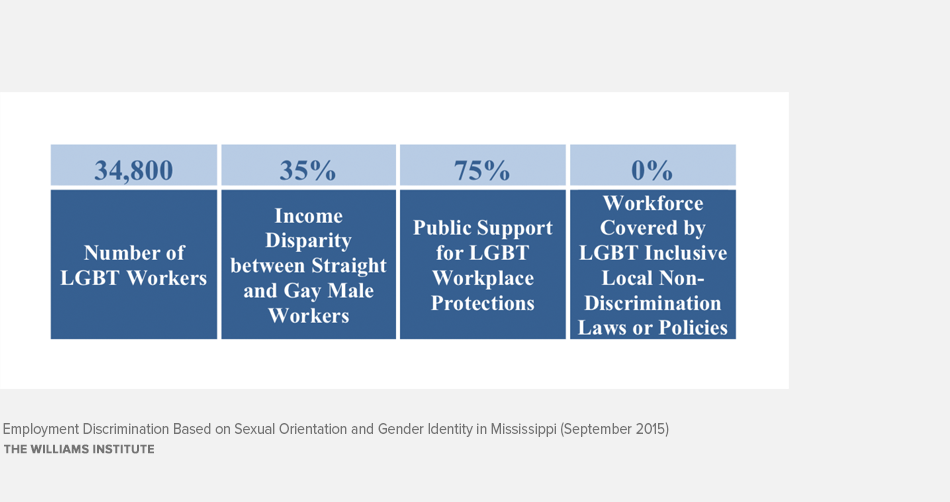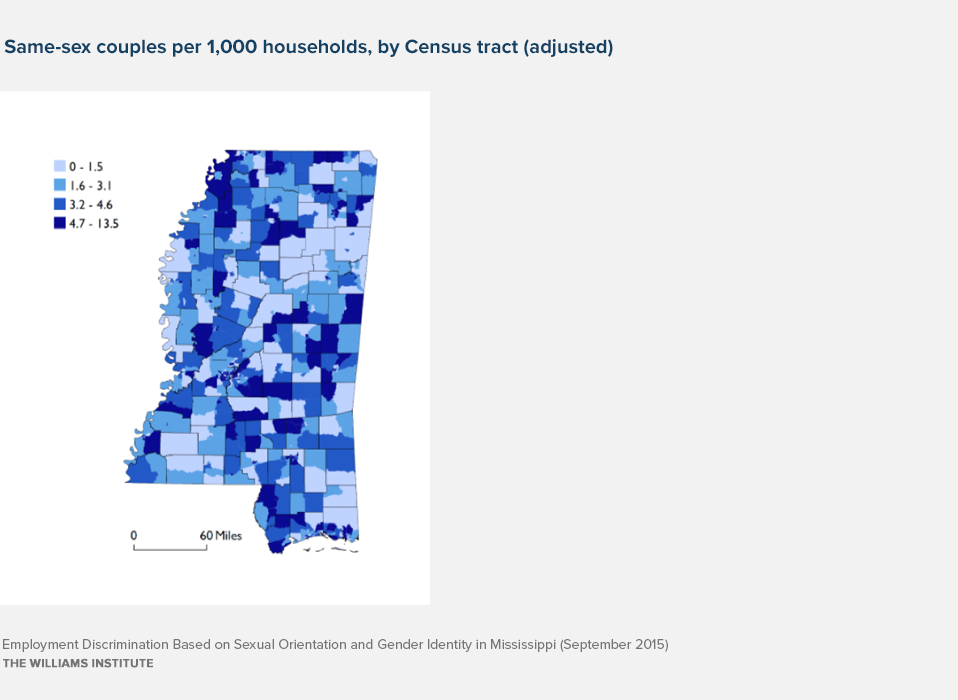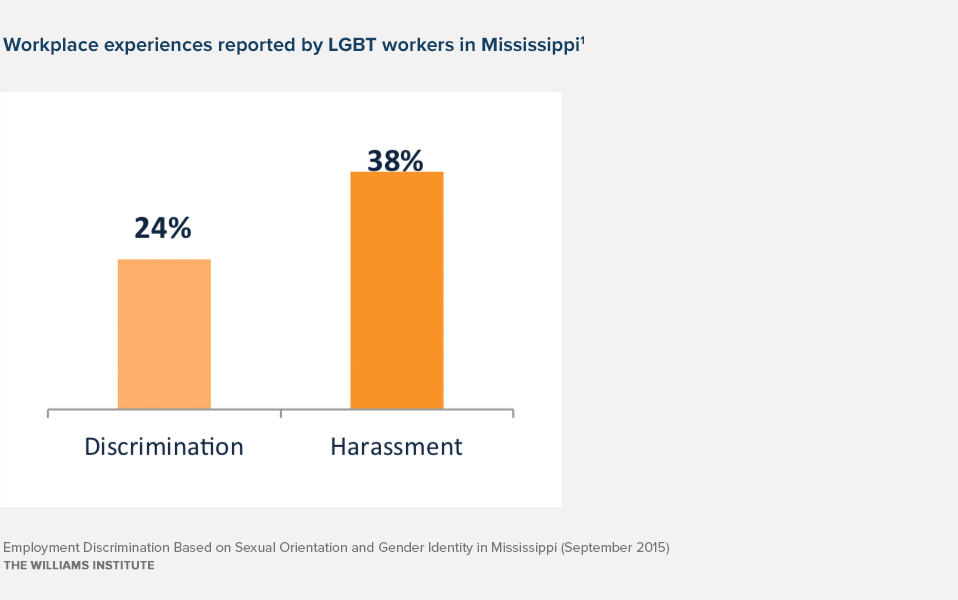Key Findings
- In total, there are approximately 60,700 LGBT people aged 16 and older in Mississippi, including approximately 34,800 who are part of Mississippi’s workforce.
- Media reports and lawsuits document incidents of sexual orientation and gender identity discrimination against employees in Mississippi. These include reports from a juvenile corrections officer, a restaurant manager, and an employee of a loan company.
- Survey data indicate that discrimination against LGBT workers is prevalent across the country, including in Mississippi. In response to a 2014 survey of LGBT people in Mississippi, 24% of respondents said they had experienced workplace discrimination and 38% said they had been harassed at work because of their sexual orientation or gender identity.
- When transgender people are surveyed separately, they report similar or higher levels of discrimination. In 2010, 78% of respondents to the largest national survey of transgender people to date reported having experienced harassment or mistreatment at work, and 47% reported having been discriminated against in hiring, promotion, or job retention because of their gender identity.
- Census data show that in Mississippi, the median income of men in same-sex couples is 35% lower than the median income of men in different-sex marriages.
- No localities in Mississippi have passed ordinances prohibiting discrimination in private sector employment based on sexual orientation or gender identity.
- A state law in Mississippi prohibits discrimination based on personal characteristics including race, religion, sex, national origin, age, and disability against state government employees, but the law does not prohibit discrimination based on sexual orientation or gender identity.
- Adding sexual orientation and gender identity to Mississippi’s law prohibiting discrimination against state government workers would extend protections to the state’s 102,000 government employees.
- Many of Mississippi’s largest private-sector employers, including Nissan, Toyota, RPM Pizza, and Harrah’s Casino have adopted internal employment policies prohibiting discrimination based on sexual orientation or gender identity.
- Public opinion in Mississippi supports the passage of non-discrimination protections for LGBT In response to a national poll conducted in 2011, 75% of those polled in Mississippi said that Congress should pass a federal law to prohibit employment discrimination based on sexual orientation and gender identity. In addition, other polls have found that 81% of Mississippi residents think that LGBT people experience a moderate amount to a lot of discrimination in the state.
Evidence of Discrimination
Survey Data and Specific Examples of Sexual Orientation and Gender Identity Discrimination in Mississippi
The existence of widespread and continuing discrimination against LGBT workers in the U.S. is well documented. In response to national surveys, LGBT people consistently report experiences of discrimination in the workplace, and non-LGBT people often report witnessing discrimination against LGBT co-workers. For example, a national survey conducted by Pew Research Center in 2013 found that 21% of LGBT respondents had been treated unfairly by an employer in hiring, pay, or promotions because of their sexual orientation or gender identity. Similarly, on the 2008 General Social Survey, another nationally representative poll, 37% of gay men and lesbians reported experiences of workplace harassment in the last five years, and 12% reported losing a job because of their sexual orientation. In 2010, 78% of respondents to the most comprehensive survey of transgender people to date reported experiences of harassment or mistreatment at work, and 47% reported experiences of discrimination in hiring, promotion, or job retention because of their gender identity.
Similar statistics have been found in surveys of LGBT individuals in Mississippi. In response to a 2014 survey of LGBT people in Mississippi, 24% of respondents said they had experienced workplace discrimination and 38% said they had been harassed at work because of their sexual orientation or gender identity. A higher percentage of those respondents in rural areas reported experiencing harassment based on their sexual orientation or gender identity (54%), compared to those in urban areas (37%). A third of LGBT respondents said they were not open about their sexual orientation or gender identity in the workplace because they feared discrimination.
Specific instances of employment discrimination against LGBT people in Mississippi have also been documented in lawsuits and the media. Recent examples include:
- In 2015, the media reported that a gay restaurant manager was fired because of his sexual orientation. A friend of the man reported that other employees of the restaurant called him derogatory names, falsely accused him of sexual harassment, and said that they disapproved of his lifestyle. According to the friend, the manager was fired by his supervisor following this mistreatment.
- In 2015, a transgender man who worked at a loan company in Mississippi reported that he was forced to leave his job because of his gender identity. He reported that he had told company officials that he identified as a transgender male after they discovered that his driver’s license listed his gender as female. He was reportedly told that his decision to express himself as a male was not in compliance with the company’s policies, and was asked to sign a document agreeing to dress as a female and to share rooms with female employees when he traveled for work. He left his job after he refused to sign the document. He has filed a lawsuit against the company alleging sex discrimination in violation of federal law.
- In 2013, a gay juvenile corrections officer reported that he was terminated after his department discovered his sexual orientation in a police report. The officer had called police when his boyfriend became physically violent towards him in his apartment.
- In 2013, a lesbian employee told the media that her boss referred to her by derogatory terms based on her sexual orientation when speaking to her co-workers.
Wage Inequity
Census data show that individuals in same-sex couples in Mississippi earn less than individuals married to different-sex partners. On average, men in same-sex couples in Mississippi earn $24,481 each year, significantly less than the $39,473 for men married to different-sex partners. The median income of men in same-sex couples in Mississippi is $20,000, 35% less than that of married men ($30,700).
Women in same-sex couples earn less than married men as well as men in same-sex couples. Women in same-sex couples in Mississippi earn an average of $21,781 per year, slightly more than women married to different-sex partners whose earnings average $21,317. The median income of women in same-sex couples in Mississippi is $16,000, which is less than that of married women ($18,000).
Surveys of transgender people find that they have high rates of unemployment and very low earnings.
Although regression analyses were not done on the earnings data above, other studies that have analyzed earnings data using such methods have found that men in same-sex couples earn less than heterosexual men, even when they have the same productive characteristics. These studies have controlled for factors unrelated to sexual orientation that may contribute to higher earnings, such as education and work experience. The studies consistently find that men in same-sex couples and gay men earn 10-32% less than similarly qualified men who are married to different-sex partners, or men who identify as heterosexual.
Current Protections from Discrimination
Mississippi does not include sexual orientation or gender identity in its statewide law prohibiting discrimination in state government employment. Further, no localities in Mississippi have enacted ordinances prohibiting employment discrimination based on sexual orientation or gender identity in employment. Several localities, however, have passed city council resolutions supporting non-discrimination against LGBT-citizens. Additionally, several large, private sector employers and many public universities in Mississippi have adopted internal policies that prohibit employment discrimination based on sexual orientation and gender identity.
State-Level Protections from Discrimination
A state statute in Mississippi prohibits discrimination against state government employees based on race, religion, sex, national origin, age, and disability. The law does not prohibit discrimination based on sexual orientation or gender identity. Amending the law to include these characteristics would extend protections from sexual orientation and gender identity discrimination to Mississippi’s 102,000 state government employees.
Local-Level Protections from Discrimination
No localities in Mississippi have passed ordinances that prohibit discrimination based on sexual orientation or gender identity in private sector employment. However, at least seven localities—Bay St. Louis, Greenville, Hattiesburg, Jackson, Magnolia, Oxford, and Waveland—have passed city council resolutions supporting non-discrimination against LGBT citizens.
Private Company and University Non-Discrimination Policies
Private companies adopt internal policies prohibiting discrimination based on sexual orientation and gender identity for a variety of reasons including improved recruitment and retention of talented employees, increasing employee productivity and customer satisfaction, and attracting a larger customer base. One study of corporate motivations behind adopting workplace non-discrimination policies found that 53% of the top companies in the U.S. with LGBT-supportive policies had adopted the policies for economic reasons.
Academic research has found that LGBT-supportive corporate policies are linked to positive business-related outcomes, including greater job commitment, improved workplace relationships, increased job satisfaction, and improved health outcomes among LGBT employees. For example, a 2006 national poll found that 89% of LGBT respondents and 72% of non-LGBT respondents reported that when deciding where to work, it was important that an employer have a written non-discrimination policy that includes race, ethnicity, sex, religion, age, sexual orientation and disability. Research also suggests that employers limit their available talent pool by screening out applicants based on their sexual orientation. One study found that the rate of screening out gay male applicants was twice as high in regions without sexual orientation non-discrimination laws.
Additionally, LGBT-supportive workplace policies can expand opportunities to secure potentially lucrative government contracts for corporate employers. A 2011 study found that 68 local governments had laws requiring contractors to have LGBT-inclusive non-discrimination policies. A number of states have similar laws that apply to state government contracts. Without such policies, companies would not be eligible to bid for contracts with these state and local governments.
Many of the largest private-sector employers in Mississippi have policies prohibiting discrimination based on sexual orientation and/or gender identity, including Nissan, Beau Rivage Resort, RPM Pizza, Harrah’s Casino, Horseshoe Tunica Hotel and Casino, Toyota, Hollywood Casino.
Additionally, seven public universities in Mississippi have adopted policies prohibiting employment discrimination based on sexual orientation, including Alcorn State University, Delta State University, Jackson State University, Mississippi State University, Mississippi University for Women, the University of Mississippi, and the University of Southern Mississippi. Two of those universities, Mississippi University for Women and the University of Southern Mississippi, also include gender identity in their non-discrimination policies.
In response to a 2014 survey of LGBT people in Mississippi, one in three respondents reported that worked for an employer with an internal policy prohibiting discrimination based on sexual orientation and gender identity.
Public Opinion
Public opinion in Mississippi supports the passage of non-discrimination protections for LGBT people. In response to a national poll conducted in 2011, 75% of those polled in Mississippi said that Congress should pass a federal law to prohibit employment discrimination based on sexual orientation and gender identity.
In addition, public opinion data indicate that Mississippi residents perceive the state as unfriendly to LGBT people. Aggregated data from two large public opinion polls found that 81% of Mississippi residents think that LGBT people experience a moderate amount to a lot of discrimination in the state.
Conclusion
Documented evidence shows that LGBT people face employment discrimination across the country, including in Mississippi. There are currently no localities that have passed ordinances prohibiting discrimination based on sexual orientation or gender identity in the state, however, a number of private corporations and public universities have added these characteristics to their internal non-discrimination policies. Public opinion in Mississippi supports legal protections for LGBT people.
Download the brief


